PERSPECTIVE: “When you're at the Istana, diplomacy becomes real to you. You see physical evidence of it in front of you.”
Major Muhammad Izzuddin Bin Amirruddin has been with the Singapore Armed Forces (SAF) for 15 years.
Currently a student with the Goh Keng Swee’s Command and Staff College to prepare for senior leadership positions in the SAF, Izzuddin was previously the Operations and Training Officer at the 9th Battalion, Singapore Infantry Regiment.
In May 2019, he volunteered to be an Honorary Aide-de-Camp (HADC) to serve in the President’s Office. HADCs come from a variety of backgrounds within the SAF and Home Team, and work closely with the President on events that she holds.
Speaking to Mothership, Izzuddin shares why he took on the role as a HADC, his favourite parts of the work, and how it connects with his full-time role in the Army.
As told to Jane Zhang
To start off, what exactly does a HADC do?
You can think of us as assistants for events.
While the President has a few full-time staff to organise and plan her events, we HADCs help in the execution of the events, and make sure that all guests are well taken care of.
This can range from large-scale local affairs like the National Day Investiture to receiving official representatives from different countries. We liaise with other government agencies like the Ministry of Foreign Affairs and the Ministry of Home Affairs to ensure the events go smoothly.
What made you want to apply for the HADC role?
I see it kind of like doing community service.
Most of the time, we're doing duties outside of our own working hours, including weekends and public holidays, because that's when the President has her events.
And working at the Istana is really cool, as there are a lot of interesting artefacts and it is a national park.
It's the kind of stuff I probably wouldn’t get to do in my daily life. So it adds a good bit of variety for, you know, learning and growth as well.
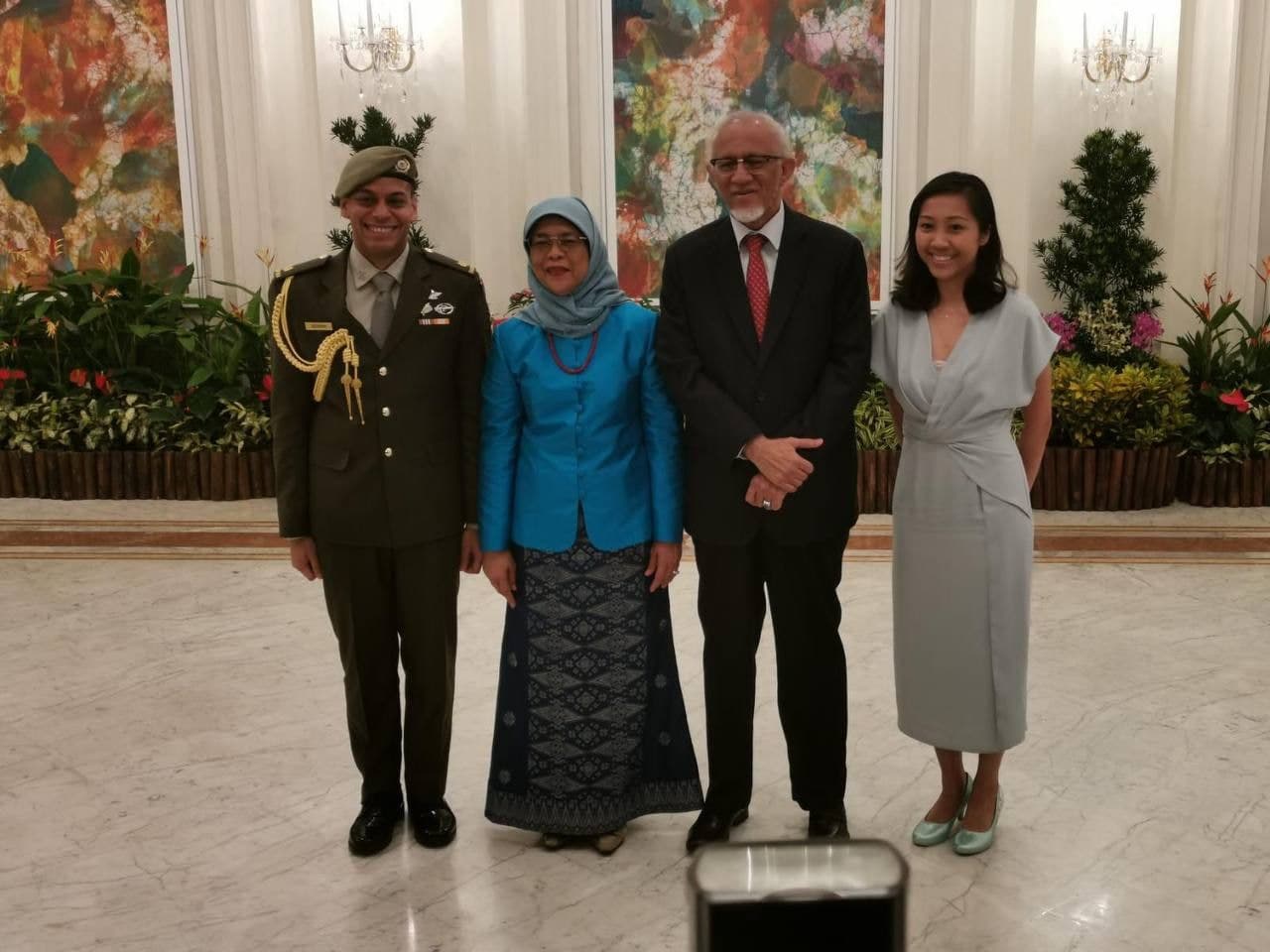 Izzuddin with President Halimah Yacob, her husband Mohammed Abdullah Alhabshee, and Izzuddin’s wife Noor Diana Binte Mohamed Sani. Photo courtesy of Izzuddin.
Izzuddin with President Halimah Yacob, her husband Mohammed Abdullah Alhabshee, and Izzuddin’s wife Noor Diana Binte Mohamed Sani. Photo courtesy of Izzuddin.
What are some misconceptions that people might have about your role as a HADC?
People think we are bodyguards.
We've also had some instances where members of the public will come and take photos with us, because they think that we are some kind of VIPs or we’re part of the President's entourage!
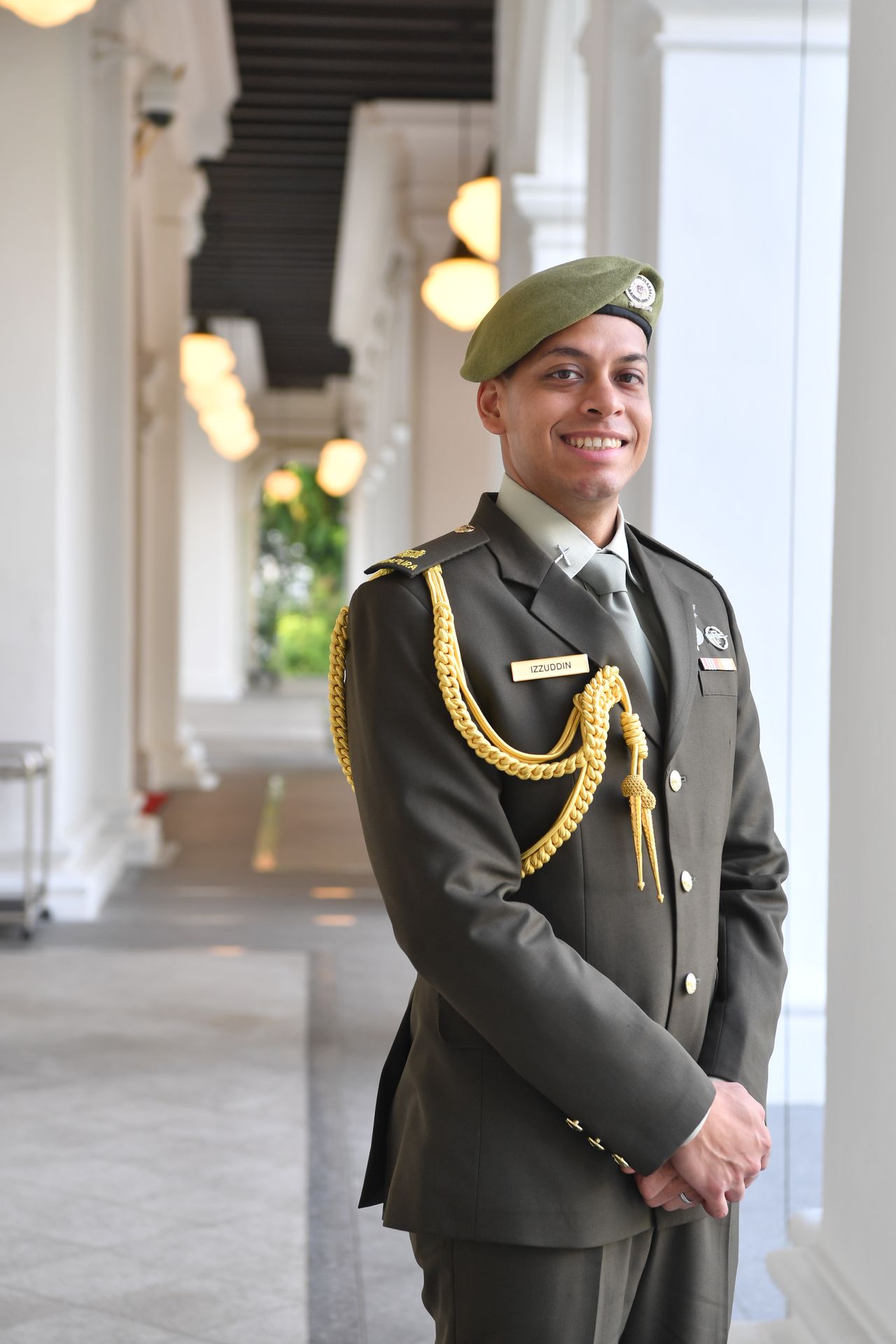 Photo via PIONEER.
Photo via PIONEER.
What has been your favourite part about your role so far in the two years that you've been a HADC?
Amongst the events which I helped to organise, I really enjoy doing open houses because that's the event where basically anybody and everybody can come to the Istana, and seeing how much people enjoy the event.
There was an event where, for the first time, the President was giving awards to cleaners and people in the cleaning services industry.
So I thought that was nice because I don't think they’ve probably ever been given an award in that kind of shape and form before.
Have you encountered any funny experiences while working at the Istana?
There was once my mother was at the Istana open house.
She tried to get me to let her through the crowd and give her a one-on-one special time with the President, and I was like, "No, I can't do that. I have to be impartial."
Yeah, that was funny. It's not often that you do crowd control and then the people that you're trying to control are your parents.
Have you gotten a chance to interact with international leaders?
One of the duties I did recently was when the President was giving out credentials to ambassadors from Germany, Chile, Bangladesh, and Brunei Darussalam.
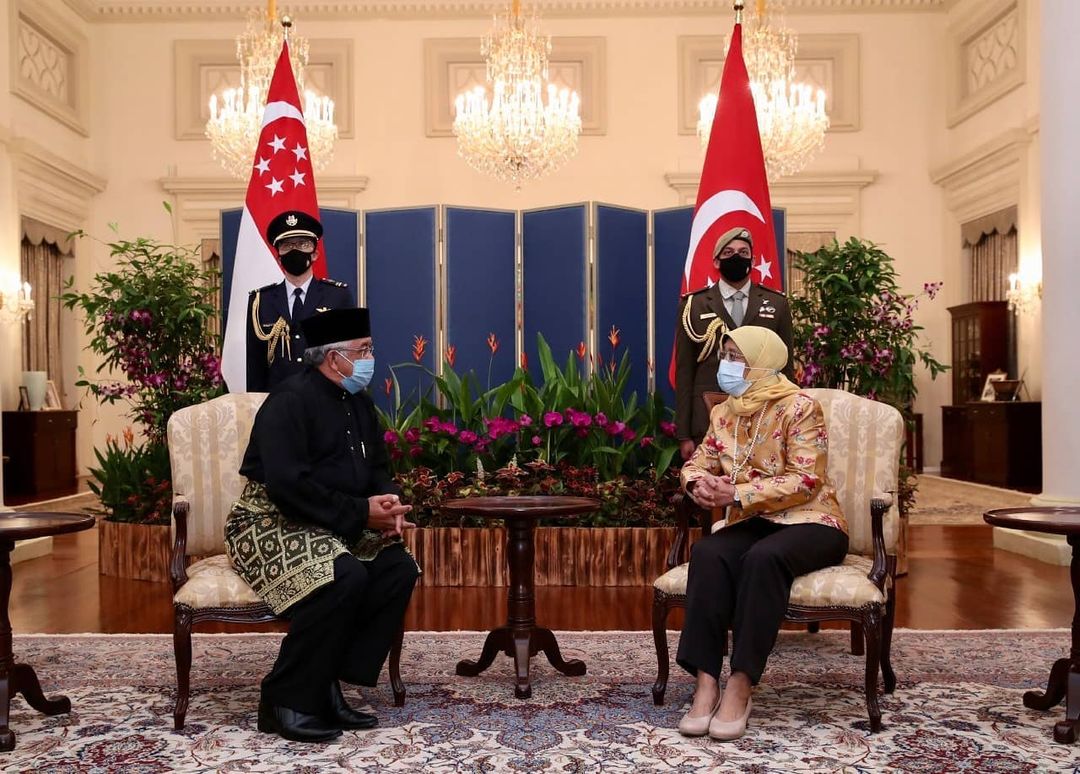 Izzuddin (back right) standing at attention as President Halimah meets with High Commissioner of Negara Brunei Darussalam, Dato Paduka Haji Sidek bin Ali. Photo by MCI / LH Goh via Instagram / Halimah Yacob.
Izzuddin (back right) standing at attention as President Halimah meets with High Commissioner of Negara Brunei Darussalam, Dato Paduka Haji Sidek bin Ali. Photo by MCI / LH Goh via Instagram / Halimah Yacob.
So it was really nice to see that happening — diplomacy happening — right from your eyes.
How do you balance between having a full time job, and also doing this volunteer HADC work?
What helps is that my wife is very supportive, and she understands. She knows that I like to do open houses, so some public holidays I won't be around.
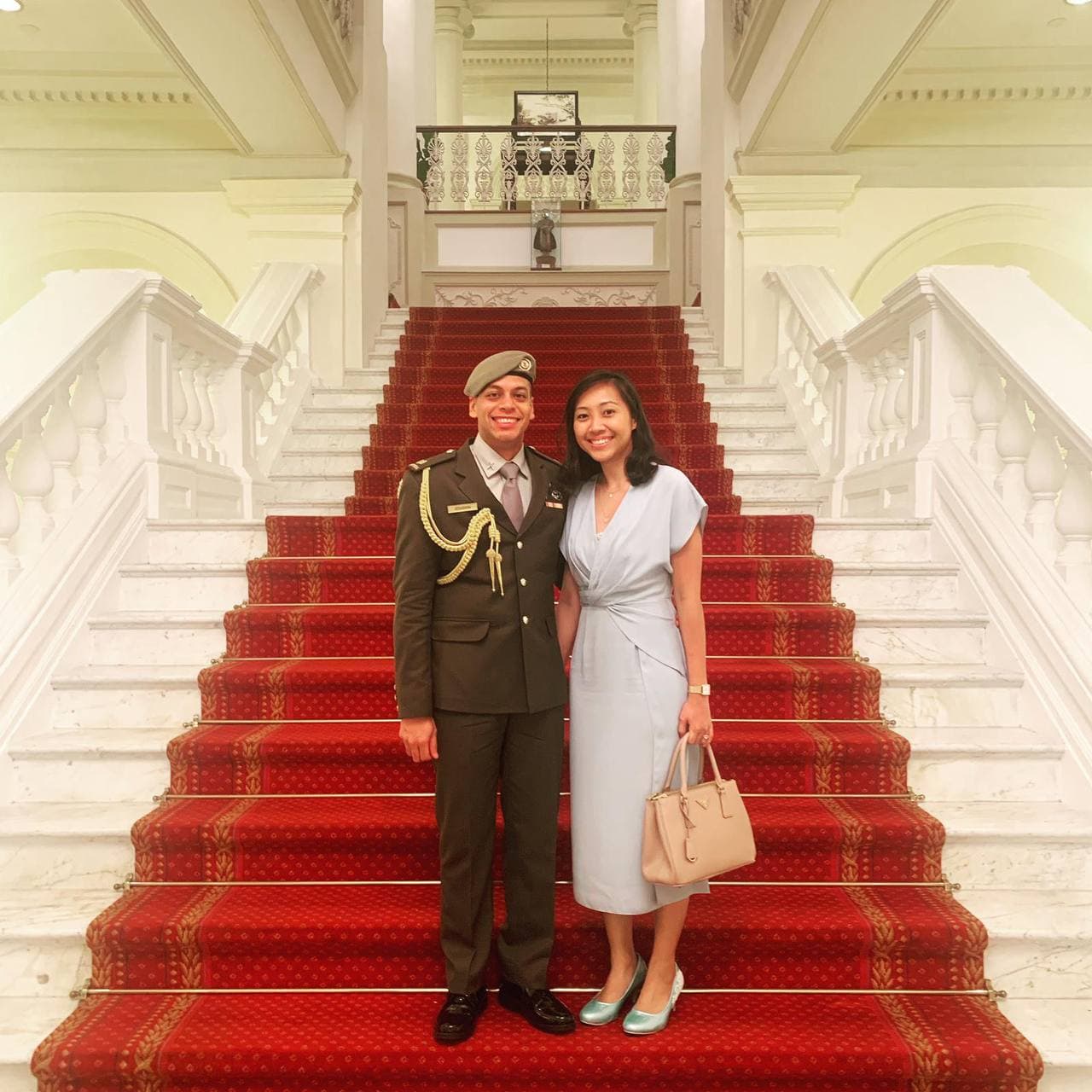 Izzuddin and Diana. Photo courtesy of Izzuddin.
Izzuddin and Diana. Photo courtesy of Izzuddin.
Other than that, I guess if you enjoy the work, and you understand and appreciate the purpose, then it's much easier to make time for it.
How is your full-time role different from your role as a HADC, and do you see any similarities or crossover skills between the two?
What was similar is that, as an infantry officer, you do spend a lot of time making plans for large scale events and organising events. So, organisational skills, planning skills, coordination — all these things are relevant to a HADC as well.
It also helps that, as an SAF officer, you're constantly reminded of why you're there and your mission and purpose for serving. It's always diplomacy first, before you start to think about aggressive determined actions.
So, in that sense, the roles kind of fit together. When you're at the Istana, diplomacy becomes real to you. You see physical evidence of it in front of you.
Both roles also require me to communicate with various government agencies. I worked quite extensively with HPB and SportSG in fitness programmes for NSmen in my previous appointment in the Army Training Department. Through that appointment, I worked on digitalisation projects with DSTA and NUS as well.
How did you actually decide to go into the SAF as a career, and specifically the role that you're in? Why did you want to serve?
I chose to be an infantry officer because when I went through basic training, I was quite inspired by my instructors, and that gave me an interest in military life.
But what convinced me that this was probably what I want to do for the rest of my life was the great culture of the unit I was posted to after I was commissioned as an officer.
It was like a big family.
People think the military is very hierarchical, which is correct structurally, but the culture in the unit is honestly not so rigid.
The seniors and superiors take care of you. They constantly check up on you. They make the effort to train and coach you. These are people who taught me a lot of life lessons that I remember even today.
And I guess when you work with full-time National Servicemen, who didn't really choose to be there, when you put in effort to get to know them, get their trust, and watch out for their welfare, it's very rewarding.
Because you try to inspire them and influence them to do something that probably they wouldn't have done if they had a choice. But once you get them on your side, they do it anyway and they do it to the best of their effort. So I think that transformation is quite amazing.
And I thought, as someone who wants to kind of spend my life serving the community or serving society, I thought that was fulfilling and meaningful.
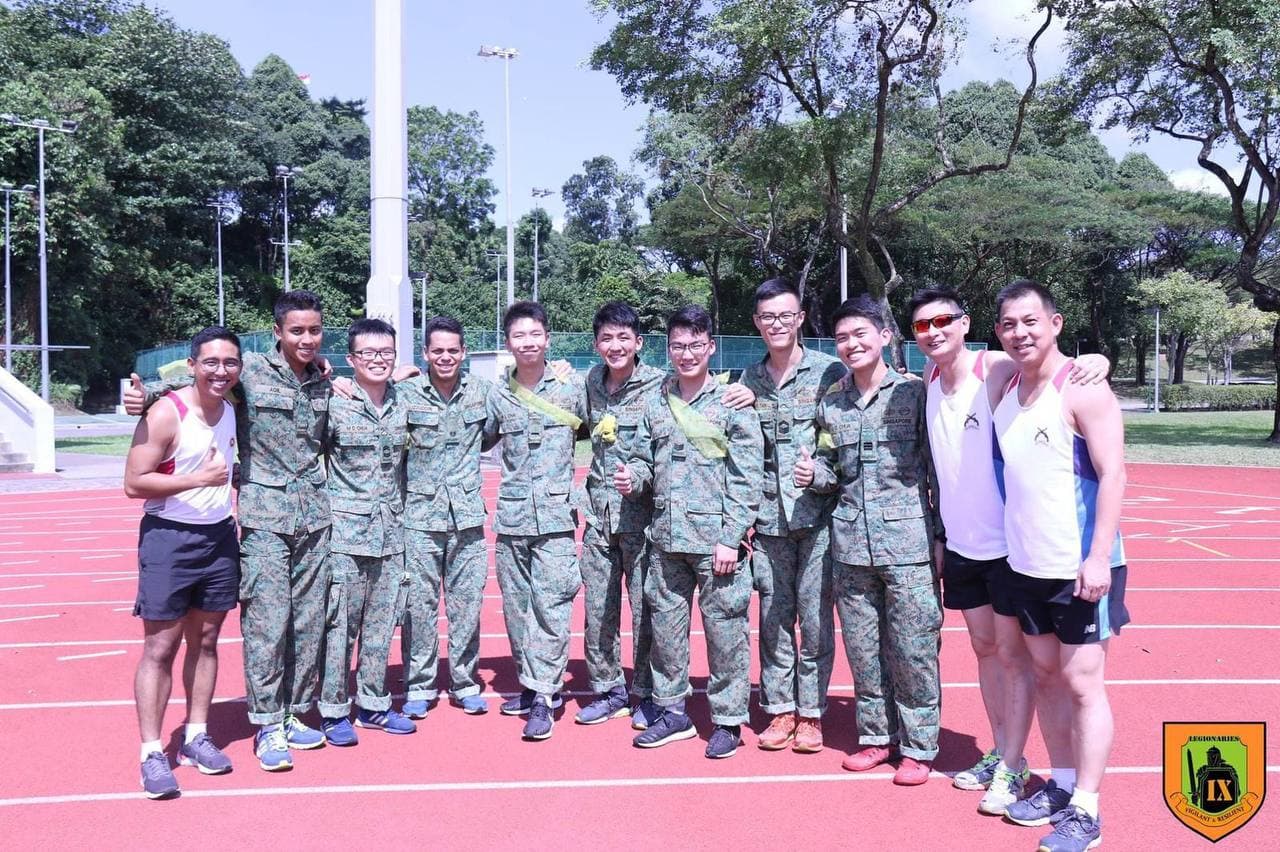 Izzuddin (fourth from left) with some men from his unit. Photo courtesy of Izzuddin.
Izzuddin (fourth from left) with some men from his unit. Photo courtesy of Izzuddin.
What is the most valuable thing you feel like you've learned from your role in the Army?
I'd probably say three things.
The Army is an organisation that encourages you and pushes you to do a lot of introspection and self-development.
So you can't really stay stagnant and rest on your laurels when you're in the Army. You constantly have to learn, enhance your skills, and get better.
Second thing is really how you deal with and how you impact people, because it's a people organisation. Ultimately, the whole Army runs on its people, and the quality of the Army rests on the quality of the people.
So you can have all the technology that you can buy or create or make, and all the weapons that you can put in soldiers' hands, but it's the will and determination of the soldier to fight, and his identification with fighting for his family, fighting for his country, that makes the difference.
That skill, if you will, of learning how to deal with people, interact with them, and inspire them — I think that that's priceless.
And third thing is, in a sense, it is a job that you don't do for yourself. There's always a higher purpose, and it's always for the soldiers, or for your team, or for the country.
And that's something that probably I shouldn't take for granted — that you can't do that in every single career that you can think of, so I think that's special.
Pursuing a career in the Army
To learn more about the meaning and drive that pushes Izzuddin and his colleagues in their work with the the Army, you can check out this video:
To learn more about the career options available in the Army, you can find out more information here.
This sponsored article is brought to you by Our Singapore Army.
Top photos via PIONEER and courtesy of Izzuddin. Some quotes have been edited for grammar and clarity.
If you like what you read, follow us on Facebook, Instagram, Twitter and Telegram to get the latest updates.
